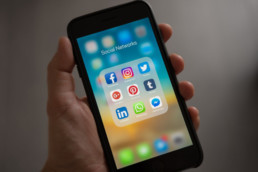Social media has a somewhat shoddy reputation. This has only been heightened by the recent Cambridge Analytica scandal on Facebook. But you know what? It's not all bad - it's actually pretty great.
Three billion people (about 40% of the world’s population) use social media, and we’re spending an average of two hours every day sharing, liking, tweeting and updating on these platforms. So, with social media playing such a big part in our lives, it’s no doubt that news channels and various professionals are picking up on the negative effects of socialising behind a screen.
We’re here to tell you about the positives, and trust us, there are plenty. We’ve whittled it down to our top 10 reasons why social media is truly great.
1. Communication is even easier
It’s undeniable that social media increases the ease of communication in a world where people are more mobile than ever before. Facebook Messenger and Skype are the glue bonding long-distance friendships and families. It also offers a type of freedom to people who found traditional forms of communicating difficult; many marginalised groups, such as the elderly and disabled, have created online communities that connect them to people all over the world, or even just down the road. Suddenly, even if you are physically isolated, you can still feel connected and sociable.
2. Creating communities
In a similar vein, social media connects like-minded people into communities where they feel safe to discuss different subjects without being ridiculed. Movements like ‘March for our lives’ and ‘#MeToo’ have gained a large majority of their support and grassroots activists through social media. By using hashtags, social media users can create communities that align with their beliefs and provide support (online and in real life). This is a great example of how social media can be misunderstood as a singular activity when really it excels at bringing people together.
Social media connects like-minded people

3. Generating job opportunities
If social media did not exist, I would not be sitting here writing this article. Not because this article is about social media, but because that is my job – to manage social media accounts. Not only that, but younger generations like millennials have really cottoned on to the value of social media as a legitimate brand platform – Justin Bieber was signed to a successful record label after proving his saleability and talents uploading covers and original songs to YouTube. Likewise, Ed Sheeran’s initial success was related to his presence on the video platform. What’s better is that as fans we feel closer to these celebrities – we have literally watched them go from bedroom singers to sell-out arena artists thanks to social media.
4. Engaging with customers
Many tech-savvy businesses benefit from having a social media presence, after all, that’s where their audience is. Not only can businesses use it as a tool to increase customer engagement, but customers use it as a tool to contact companies for enquiries and complaints. Twitter is a great example of this, with many large brands having dedicated customer service accounts where customers can get replies within minutes.
5. Free lessons in pretty much anything
Have you ever watched a ‘how to’ video on YouTube or Facebook – be that make up tutorials, solving software issues, playing instruments, cooking dishes, gym workouts, etc? Congratulations, you’ve used social media to learn something new! More than ever, we are reaching for our phones to find the answers to everything and anything.
6. Breaking news faster than ever
Nothing spreads faster than news on social media. Whether it’s a football club signing, a terrorist incident, a political upset, or a famous couple ending their relationship; chances are, it’ll be trending on Twitter before you can say “Donald Trump”. Twitter is great at breaking the news but problematic at qualifying the facts. After the initial story breaks, the lines between facts and fiction can get a bit blurry, especially on Twitter where 328 million monthly active users can pile in with opinions. But it’s worth remembering that while mistakes can be made more quickly than traditional media, they can also be fixed just as quickly.

Twitter is great at breaking news
7. Sending messages of safety
One of the most useful features Facebook has developed in the past few years is a ‘mark yourself safe’ option, Safety Check. This feature was first established during the devastating earthquakes in Nepal in 2015 but have since been used in acts of terrorism in Paris, Brussels and London. You have the option to mark yourself as ‘safe’ after an incident or natural disaster in your surrounding area, so your friends and family all over the globe know you’re OK. Features like this can relieve some of the pressure off overloaded infrastructures where disaster has struck.
8. Communal learning
One unlikely outcome of the meteoric rise of social media use is a better communal understanding of some subjects. Cast your mind back a month or so and you may remember social media raving about an audio clip that divided listeners. Some of them could hear ‘Yanny’ and some of them would hear ‘Laurel’ – we bet if it did find its way onto your feed, you now know why we hear different names. This is a learned experience; something you have learnt simply from the hype of social media. Although they seem trivial trends and tend to be over in a day or two, some pretty interesting articles have been written about what we can learn about ourselves from these communal discussions.
9. A global marketplace
The integration of online shopping into a selection of different apps has made it easier than ever before to make purchases (we’re counting this as positive, but your bank balance might not agree). This isn’t just about YouTube and Instagram influencers trying to tout their newest clothing collaborations; Instagram has enabled many designers, photographers and illustrators to curate followings and sell their work to audiences all over the world.
10. Social media gives everyone a voice
The final point to be made is that there are no gatekeepers when you publish via your social profile (aside from each platform’s terms of use) – you can write anything, and anyone has the chance to view it. Social media tends to be more democratized than traditional print media (which hasn’t always offered the most representative sample of voices) and it has given everyone a medium through which to express themselves.
There you have it – our top 10 reasons why social media is great. Considering the improvements that social media has made to lots of aspects of our lives, as evidenced above, it seems a little harsh to write it off in one fell swoop.
What do you think, have we persuaded you into giving social media another chance?

